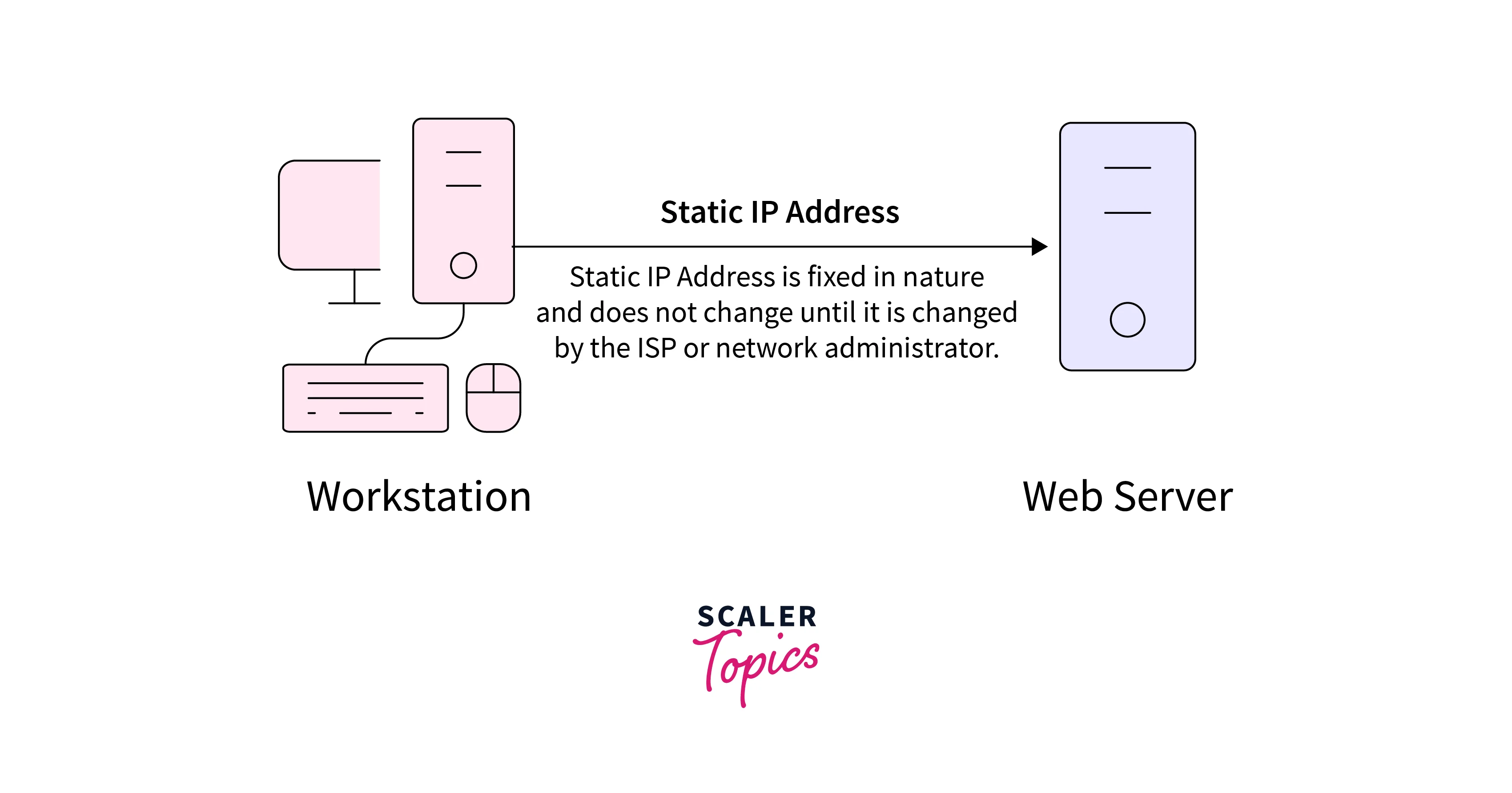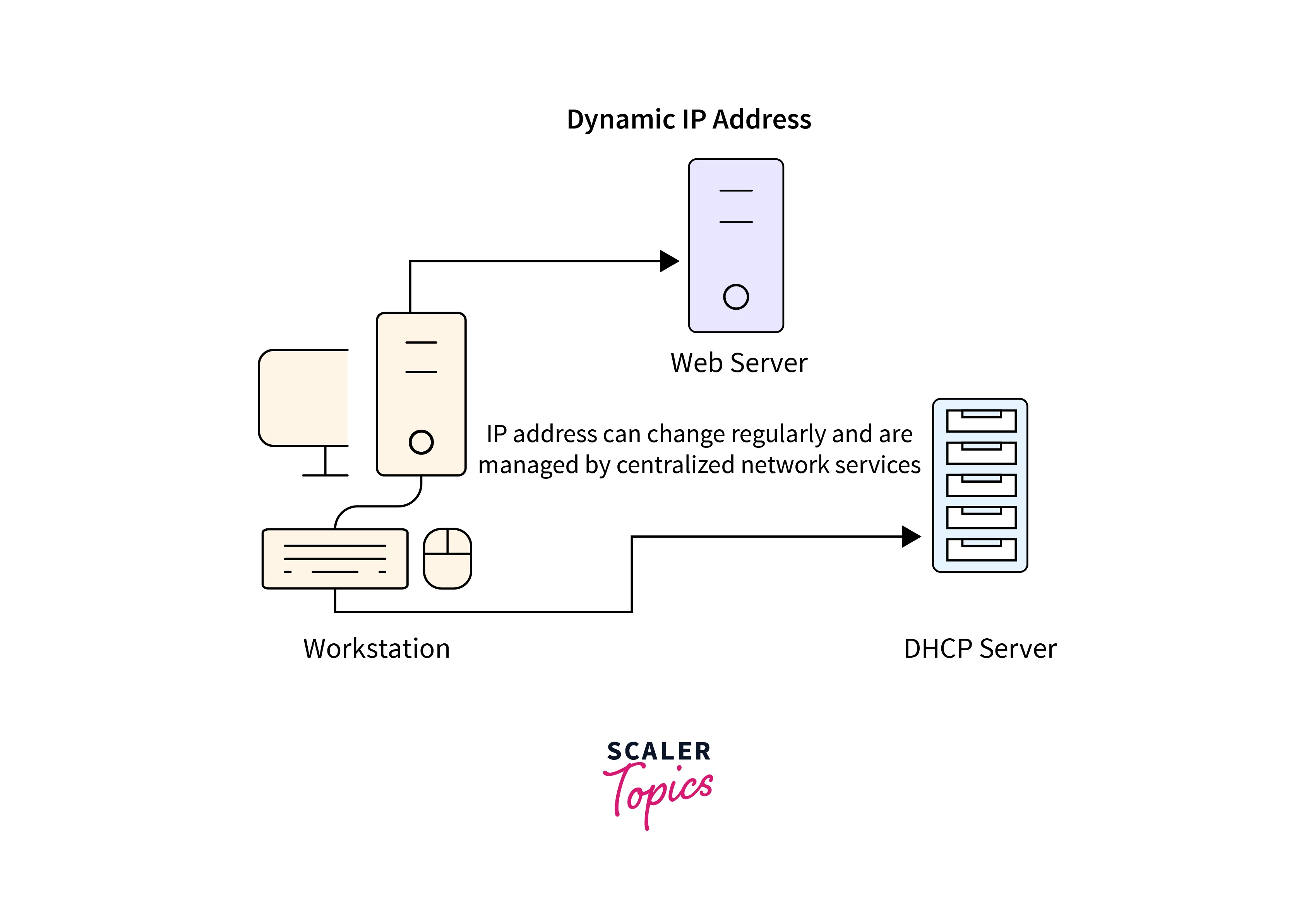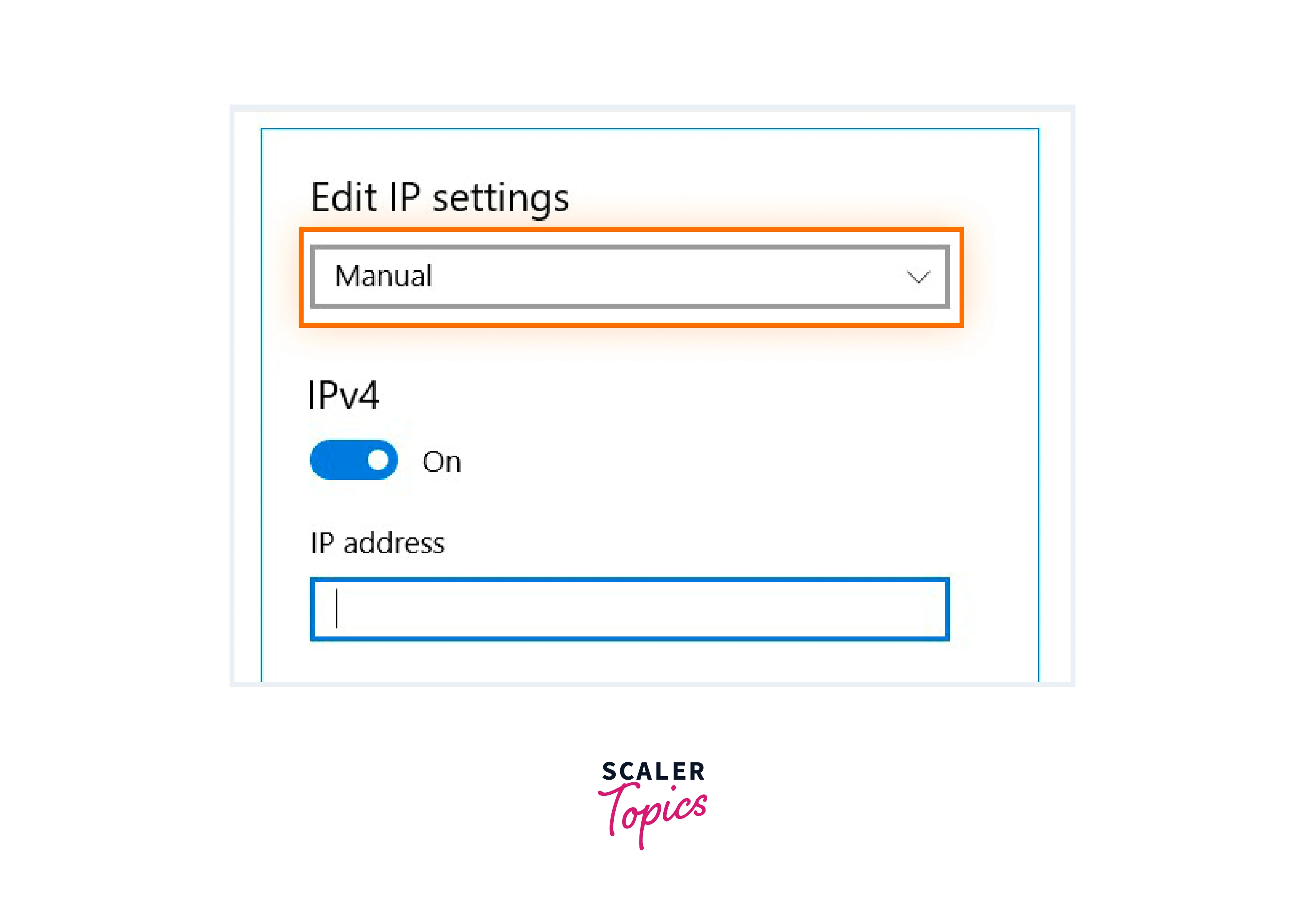An IP address is a numeric identifier assigned to a computer within a network that uses the Internet Protocol for communication. This address uniquely identifies a host or a network interface and enables targeted communication to a particular destination. The ISP (Internet Service Provider) assigns an IP address, which is the logical identifier for a computer connected to a network. Every unique instance connected to any computer communication network using TCP/IP communication protocols gets an IP address. This article will discuss what is the difference between static IP and dynamic IP.
What is Static IP Address?
A static IP address is the IP address that was explicitly allocated to a device rather than one that was assigned by a DHCP server. It is called static because it does not change, compared to a dynamic IP address, which varies.
Note: DHCP (Dynamic Host Configuration Protocol) is a network device or software application that automatically assigns and manages IP addresses and related network configuration parameters to devices on a local network. These parameters include IP addresses, subnet masks, default gateways, DNS server addresses, and other settings necessary for proper network communication.

Static IP addresses are steady and are manually assigned to individual system devices. This method was the earliest approach for providing IP addresses to devices within a network. Within the network configuration settings, the network administrator manually inputs the IP address for each system. Furthermore, the administrator must define details like the subnet mask and default gateway. This process also needs to be repeated for all devices connected to the network. As a result, allocating IP addresses across an extensive network of devices becomes a complex task.
Furthermore, the static address remains unchanged unless modified directly by the network administrator or the Internet Service Provider. Additionally, static IP address remains consistent across different network connections. In simple words, the device consistently accesses the internet using the same IP address. Consequently, employing static IP addressing offers several benefits. It facilitates remote access with reduced downtime. Moreover, users can conveniently access the device from any location.
What is Dynamic IP Address?
A dynamic Internet Protocol address is a temporary IP address assigned to a computing device or node when it connects to a network. A DHCP server automatically provides a dynamic IP address to every new network node.

Dynamic IP addresses are commonly set up on devices using the DHCP protocol and undergo regular updates. The dynamic IP address undergoes continuous changes whenever a user connects to a network. A server implementing the Dynamic Host Configuration Protocol manages the task of monitoring and providing IP address details for active network elements.
Internet Service Providers (ISPs) and networks with a large number of connecting clients or end nodes typically use dynamic IP addresses. A DHCP server is responsible for assigning, reassigning, and modifying dynamic IP addresses. The limited availability of static IP addresses within the IPv4 framework is a primary driver for adopting dynamic IP addresses. This approach enables a single IP address to be shared among multiple nodes, serving as a workaround for the scarcity issue.
What is the Difference between Static IP and Dynamic IP Address?
The following table outlines what is the difference between static IP and dynamic IP.
| Basis of comparison | Static IP Address | Dynamic IP Address |
|---|---|---|
| Definition | A static IP address is a permanent IP address that is manually allocated to a device or a node. | A dynamic IP address is a temporary IP address assigned to a computing device or node when it connects to a network. |
| Modification | Static IP addresses do not vary over time, which means that if one gets assigned, it cannot be changed or altered. | The dynamic IP address can be changed dynamically over time. |
| Security | It is less secure than a dynamic IP address. | It provides high security as compared to a static IP address. |
| Cost | Its utilization and maintenance is costly. | Its utilization and maintenance are less costly. |
| Stability | Static IP address is highly stable. | Dynamic IP address is less stable than static IP address. |
| Provider | The Internet Service Provider or ISP provides the static IP address. | Dynamic Host Configuration Protocol (DHCP) generates dynamic IP addresses. |
| Traceability | A device with a static IP address can be tracked. | It is relatively difficult to track a device with a static IP address. |
| Application | It is utilized in situations where the computational data is less confidential. | It is utilized in situations where the computational data is confidential and requires high security. |
Advantages and Disadvantages of Static IP Address
Advantages
- Reliability: A static IP address remains constant throughout the time, ensuring a consistent and dependable connection for services such as remote access, gaming servers, and websites.
- Security measures: As the IP address does not vary, it is easier to implement security measures such as firewalls and access controls appropriate to a given address.
- Ease of Access: Static IP addresses make remote access to devices or services easier. Users can locate and connect to a device using its consistent IP address.
- Device Management: Static IP addresses make it easier to maintain and monitor network devices because their addresses remain constant.
- Reduced Network Overhead: Dynamic IP assignment requires frequent interactions with a DHCP server, which adds some network overhead. Static IP addresses reduce this overhead.
- Faster Resolution: In cases of DNS propagation delays, static IP addresses can provide faster resolution for services like websites, as they don’t change and are directly associated with the service.
Note: DNS propagation delay is the time it takes for changes to DNS records, like IP address updates, to be recognized worldwide. It varies due to factors like TTL settings, caching, and server refresh rates. Changes can take minutes to 48 hours to propagate fully across all DNS servers.
Disadvantages
- Cost: Some ISPs charge higher for static IP addresses, making it a less cost-effective option compared to dynamic IPs for general users or regular home users.
- Low Flexibility: Static IP addresses are assigned to specific devices, which can be limiting if you need to connect different devices to your network frequently.
- Maintenance Challenges: If your network infrastructure changes, such as when you replace a router or move around, you may need to manually modify static IP settings on each device.
- Easily traceable: As a static IP address remains constant, your online activities may be more easily monitored.
- Complex Network Management: In larger networks with numerous devices, managing and coordinating static IP addresses across devices can become complex and error-prone.
Advantages and Disadvantages of Dynamic IP Address
Advantages
- Ease of Setup: The DHCP server automatically assigns Dynamic IP addresses, making the initial setup and configuration of devices simpler for users.
- Cost Efficiency: Many ISPs provide dynamic IP addresses by default at no extra charge. As a result, they are a cost-effective option for most users.
- Scalability: Dynamic IP addresses are ideal for networks with a high number of devices or clients. They are capable of allocating and managing addresses without the need for manual intervention.
- Anonymity: With dynamic IP addresses, you can remain anonymous online because your activities aren’t as closely linked to a single IP address.
- Flexibility: With dynamic IPs, devices can join or leave the network with ease because addresses are assigned temporarily.
- Simplicity in Network Changes: If your network infrastructure changes (for example, a new router), dynamic IP addresses update automatically, eliminating the need for manual reconfiguration.
Disadvantages
- Lack of Custom Security: Implementing security measures related to a specific IP address becomes difficult because the IP address changes frequently.
- Delayed Access: Dynamic IP address changes might take time to propagate through the Domain Name System (DNS), causing delays in accessing services after the address changes.
- Unpredictable Address Changes: As dynamic IP addresses vary frequently, finding and linking to devices or services might be difficult, especially for remote access.
- Limited Control: Users have less control over the IP address assignment process, which may result in occasional connectivity issues if the DHCP server assigns an address incompatible with a particular use case.
How to Get a Static IP Address?
Utilize advanced settings to allocate an IP address exclusively for a device within your local network. This reserved IP address remains unchanged unless you cancel the reservation or remove the device from your network, even if the device becomes disconnected.

How to Get a Dynamic IP Address?
Configure dynamic DNS using advanced network settings. This functionality automatically updates your server’s DNS entry with its latest IP address whenever it changes. As a result, external users can consistently access your server using the same domain name. You can select your preferred Dynamic DNS provider without installing additional software on your computer.
Conclusion
- In this article, we have briefly discussed the comparison of static IP vs. dynamic IP.
- An IP address is a numeric identifier assigned to a computer within a network that uniquely identifies a host or a network interface and enables targeted communication to a particular destination.
- A static IP address is a permanent IP address that is manually allocated to a device or a node.
- Static IP addresses do not vary over time, which means that if one gets assigned, it cannot be changed or altered.
- A dynamic IP address is a temporary IP address assigned to a computing device or node when it connects to a network.
- The dynamic IP address can be changed dynamically over time.
- The Internet Service Provider or ISP provides the static IP address, while Dynamic Host Configuration Protocol (DHCP) generates dynamic IP addresses.
